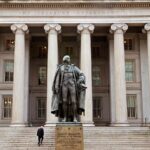|
Getting your Trinity Audio player ready...
|
For the past month, we are witnessing many discussions, analyses, and opinions about the state of the economy in the US and the world. Many market and economic analyzers are comparing the current correction in the US stock market with the correction in 2018. In 2018 the FED chairman Powell started a series of interest rate hikes, which resulted in a 20% decline in the US stock indexes. Back in 2018 Chairman Powell fell short to increased the US interest rate above 2.5%. Perhaps back then, the Federal Reserve of the US felt that enough air went out of the stock market and the economy that they can pause back for a moment. Also, in 2018, the FED chairman Powell was wildly criticized and under heavy political pressure for his action to tighten the financial conditions.
So, is it 2018 again? No. Yes, we have more than a 20% drop in the stock market, and yes, we have a decline in the economic activities in the US. Also, we have similarities in the Unemployment rate, back in 2018, the US unemployment rate was below or around 4%, and now it is the same, we started 2022 with a 4% unemployment rate, and now it is at 3.6%. And yes, the Federal Reserve of the US managed to let some air out of the bubble in the stock markets and cool down the US economy.
However, we have one major difference, back in 2018, the inflation rate in the US was just above +2.00%, barely above the FED target, and now the inflation rate is above +8.00%. That is why the current White House administration and the politicians from both sides of the aisle support the FED measures to fight inflation.
The markets participant are waiting for the latest monetary statement from the Federal Reserve of the US, due on June the 15th, 2022. Will the FED Chairman Powell change course and suggest a possibility of a pause in the interest rate hike in September, as some FOMC members commented in the past month. Can the Federal Reserve manage to bring down the inflation and cool down the economy, without causing a recession in the US and without a crash in the stock markets? If so, that will be the third time in the past ten years when the Federal Reserve manages to somehow avoid the unavoidable. Or perhaps it is better, and as Elon Musk suggested this last week, way out of due time, to let some companies go out of business and let the economy and the markets through a period of self-correction and recession. In that scenario, is it going to be a recession or stagnation?
In the past two weeks both, the Reserve Bank of New Zealand and the Bank of Canada raised their interest rate by 0.50%. Both Central Banks expressed their determination to fight inflation and the need to further, raise the interest rate.
This coming week the markets are waiting to see the latest monetary statement from the Reserve Bank of Australia (RBA). The Central Bank is expected to raise the Australian interest rate from 0.35% to 0.60%. Are we going to witness an announcement for more aggressive action from RBA for the second half of 2022?
Next week, all eyes are on the ECB, the markets are expecting an announcement of an interest hike in July. The only question is whether the ECB will hike the interest rate by 0.50% in July or 0.25% in July, and then another 0.25% later in 2022.


